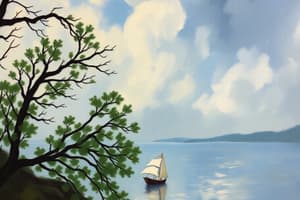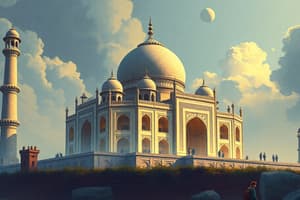Podcast
Questions and Answers
What is the main focus of the Geography of India section in Class 9 curriculum?
What is the main focus of the Geography of India section in Class 9 curriculum?
- Study of India's political geography (correct)
- Study of India's technological advancements
- Study of India's wildlife conservation
- Study of India's cultural heritage
Which aspect is covered under the Human Geography section in Class 9 curriculum?
Which aspect is covered under the Human Geography section in Class 9 curriculum?
- Environmental conservation projects
- Astronomical studies
- Archaeological excavations
- Industrialization and economic development (correct)
What is the focus of the Citizenship theme in the Civics section of Class 9 curriculum?
What is the focus of the Citizenship theme in the Civics section of Class 9 curriculum?
- Art and culture appreciation
- Historical wars and strategies
- Rights and responsibilities of citizens (correct)
- Sports and athletics training
Which area of study is emphasized in the Constitution theme of the Civics curriculum for Class 9?
Which area of study is emphasized in the Constitution theme of the Civics curriculum for Class 9?
What is the ultimate goal of studying historical, geographical, and civic foundations in Class 9 according to the text?
What is the ultimate goal of studying historical, geographical, and civic foundations in Class 9 according to the text?
What is one example of agroforestry mentioned in the text?
What is one example of agroforestry mentioned in the text?
How can individuals support natural vegetation and wildlife conservation efforts?
How can individuals support natural vegetation and wildlife conservation efforts?
What is the primary prey of polar bears?
What is the primary prey of polar bears?
How can individuals get involved in conservation according to the text?
How can individuals get involved in conservation according to the text?
Which land-use system integrates trees, shrubs, and forage plants to support both agriculture and wildlife?
Which land-use system integrates trees, shrubs, and forage plants to support both agriculture and wildlife?
Flashcards are hidden until you start studying
Study Notes
Class 9 Curriculum Overview: History, Geography, and Civics
As you progress through your ninth grade school year, you'll encounter a rich and diverse set of subjects that will expand your understanding of the world and its past, present, and potential future. The following is a broad overview of the Class 9 curriculum, focusing on the subjects of History, Geography, and Civics.
History
Your History classes will delve into the period of Indian history from ancient to modern times. The course is divided into two major themes: Ancient India and Modern India.
Ancient India:
This part of the curriculum covers the period from 250 BCE to 1000 CE. You'll learn about the Mauryan Empire, the spread of Buddhism and Jainism, the rise of Hinduism, and the influence of trade and cultural exchange.
Modern India:
This section of the curriculum covers the period from the 16th century until present day. You'll learn about the Mughal Empire, the Age of British Colonialism, the Indian Independence Movement, the formation of the Republic of India, and the impact of globalization on modern Indian society and politics.
Geography
Your Geography classes will focus on the physical and human geography of India, as well as the world as a whole. The course is divided into three main themes: Physical Geography, Human Geography, and Geography of India.
Physical Geography:
You'll learn about the topography, climate, drainage systems, and natural resources of India. This includes studying the Himalayas, the Thar desert, the Ganges River, and India's agricultural land.
Human Geography:
You'll learn about the population, urbanization, industrialization, transportation, communication, and economic development of India. This includes studying the impact of demographic changes, land use patterns, and the distribution of natural resources on the country's development.
Geography of India:
You'll learn about India's political geography, including its boundaries, regions, and states. This includes studying India's international relations and its place in the global community.
Civics
Your Civics classes will focus on the principles and practices of democratic governance. The course is divided into three main themes: Citizenship, Constitution, and Government.
Citizenship:
You'll learn about the rights and responsibilities of citizens, as well as the role of citizens in the democratic process. This includes studying the concept of citizenship and its implications for individual and collective action.
Constitution:
You'll learn about the structure and functions of the Constitution of India, as well as its historical context and evolution. This includes studying the various articles of the Constitution and their relevance to democratic governance.
Government:
You'll learn about the structures and institutions of the Indian government, as well as the roles and responsibilities of various government agencies and officials. This includes studying the legislative, executive, and judicial branches of government, as well as their interaction and relationship with one another.
By the end of your Class 9 year, you'll have gained a solid understanding of the historical, geographical, and civic foundations of India and the world. This knowledge will serve as a strong foundation for your further studies and will help you to engage with the complex and dynamic world in which we live.
Studying That Suits You
Use AI to generate personalized quizzes and flashcards to suit your learning preferences.




